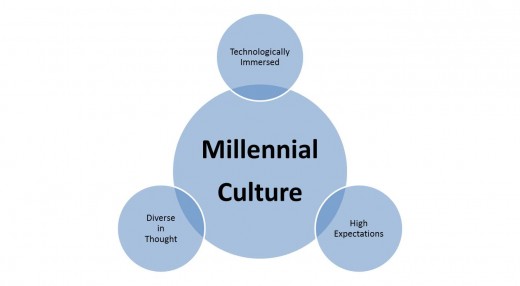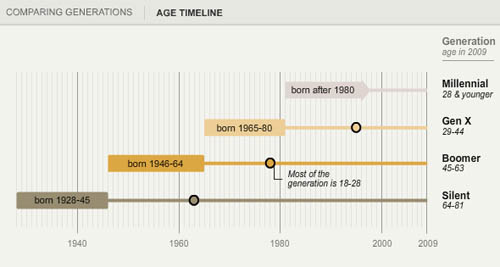Millennials
Millennials - Who are they? How do we win them over to the faith?
The youthful Millennial who is 28 years and younger and are a difficult win for Christianity. With 70 years of godless secular education combined with the Humanist Manifesto pushed by an active media doing what is right in their own eyes with profit being their goal.
We will ask who they are?
And, How we can win this dynamic media conscience group of people?
We will also make any final conclusions. Thank you for reading.
Millennial Culture

What age group are the Millennials within?
Jesus loves all age groups He created. He loves the Millennial as He does you me and everyone. We Christians of other age groups need to love them and show them the grace we were given when meeting Jesus Christ ourselves.
The Millennials will love Jesus because He first loved them by dying on the cross for their sins. We must let them know. He isn’t finished with all of us and including the 28-year-old and under who are reading this who are the Millennials.
When I went to Bible University I learned a lot about Jesus and the Church because I had time to do so. He loves us each individually and He loves all Christians collectively, the Universal Church, who are His bride (Ephesians 5; Revelation 21).
He’s working right now to make us a beautiful bride to present to Himself someday. He loves us, and I work hard, some days it’s harder than others, to love the Church because Jesus loves the Church.
When you love Jesus and your heart gets entangled with His, you start to love what He loves. So despite any frustrations with the local church, a lack of general awareness, a lack of compassion in social justice, a lack of practical love for those struggling or who are different, or a lack of authentic community. I choose to go to a local church because we’re part of the Universal Church, whom Jesus loves.
Let us check a few facts to understand the Millennial age group. According to a reliable polling firm Pew Research, the majority of Millennials were born after 1980, make them 28 and younger at the time of this writing. It is a generation making up the largest portion of the American workforce. While a majority do not hold the religious views of their parents, the ones that do are firmly dedicated to the Christian faith.
Interestingly, they do not head up the largest group of heads of households - that honor is withheld for the Baby Boomer and Generation X group - but do hold the dishonor of being the largest group living in poverty. Let us take a look at the Millennial group as it relates to faith and the body of Christ.
The Age Groups of Generations in the US

Who are the Millennials in relation to the body of Christ
There is some 27 percent of Millennials who are typically married. Also, 62 percent hold down a paying job. When it comes to society and the body of Christ, who shapes what we have in America, there are some interesting facts!
I like a quote by David Kinnaman of Barna Research, "Like it or not—and there are plenty of reasons not to—consumer culture shapes what people expect of church and how some churches approach ministry."
Only 30 percent find Church in a building with other believers as something relevant in their life. Almost 6 in 10 who grow up in the Church do not go back and make up some 59 percent who are unchurched. Barna's overall research found:
"Parents and leaders have long been concerned about the faith development of the generation born between 1984 and 2002. There are good reasons.
First, Barna's research shows nearly six in ten (59%) of these young people who grow up in Christian churches end up walking away from either their faith or from the institutional Church at some point in their first decade of adult life.
Second, the unchurched segment among Millennials has increased in the last decade, from 44% to 52%, mirroring a more significant cultural trend away from churchgoing among the nation's population."
Steve McSwain, in his article "Why Nobody Wants To Go To Church Anymore," says:
"According to the Hartford Institute of Religion Research, more than 40 percent of Americans, "says" they go to church weekly."
As it turns out, however, less than 20 percent are actually in Church. In other words, more than 80 percent of Americans are finding more fulfilling things to do on weekends than to attend church services."
Furthermore, somewhere between 4,000 to 7,000 churches close their doors every year.
Southern Baptist researcher Thom Rainer, in a recent article entitled "13 Issues for Churches in 2013, "puts the estimate higher. He says, "between 8,000 and 10,000 churches will likely close this year."
There is a problem not just with the Millennial, but with all age groups. The issues need to be addressed and quickly for the health of the Church as we have recently lost one of its greatest advocates with the death of Billy Graham.
The Light on the HIll

How Do We Reach The Millennial
"Most Millennials don't look for a church facility that caters to the whims of pop culture. They want a community that calls them to deeper meaning," said Clint Jenkin, Vice President of Research, Barna Group, Ventura, CA
How do we accomplish a more profound meaning?
1. No Hypocrisy
Christians must be entirely different than their unsaved counterparts.
The deeper meaning in bringing the Millennial back to the body of Christ means no adult was doing what they should not be doing either. We need to think about what we are doing concerning how those around us see them.
No hypocrisy must be involved with the believer in Christ. None! Instead, the defining differences in a Christian's interaction with non-believers must be love and grace combined with an immediate urgency to save the lost.
After all, he first loved us as well.
2. The Gospel
It is still as it always has been. The light of God and the Gospel of Christ against the darkness of the world.
In a recent study, Millennials are the least engaged with the Bible at 17 percent who believe the Bible is from God!
That is truly pathetic and shows the secular education system of the last 70 years in America has convinced many they are an end unto themselves. The ungodly Humanist Manifesto has done a much better job of educating the masses on matters relevant to the Church.
However, for the Millennial who is seeking a deeper meaning, the Gospel of Jesus Christ is the starting place for salvation, justification, and the beginning process of sanctification. For those that have already started, God bless them.
3. The Smartphone Generation
I'm incredibly concerned that we are losing the youth of this generation who are engaged in their smartphones, laptops, Ipad, gaming, and other connected devices instead of being led into a budding Christian life by their parents and the Church.
One study suggests that almost 70 percent of Millennials spend an average of over seventeen hours a day on a laptop, smartphone, tablet, Ipad, or other media. That is not a typo. Instead, it is a vivid snapshot of what the Church effectively exists in today.
Kenda Creasy Dean has a revealing look at how the Millennial group seems to like Christianity but fails to live it out. Many may have had parents doing the same – saying one thing and doing another.
Hypocrisy is strikingly evident to the children and youth of today. Parents seem to have done a terrible job of raising Millennial males or females. Take the smartphone away from the Millennial of today, and they suddenly become dysfunctional.
Our daughters have proved this time and time again. Rachel H. Evans has an enlightening look at why the Millennial is leaving the organized Church of today. Her article is a must-read!
I can recall a time when my mother understood that we were going to Church. It was great to see my friends from school and others who were there. Today they interact with one another in video chat and text messaging.
They also can stay connected to the Church as well. So it can be used for good or evil just like anything else.
The formal Church has lost the Millennial group
With just over 50 percent of the Millennials unchurched the formal church must find a way to get them back. Faith in God and salvation through Jesus Christ is more relevant today than in any previous generation. We need to get back to the Gospel as preached by the Apostles Paul, Peter, Silas, and Apollos.
In God We Trust?

Do we really? We need to answer this honetly!
"In this, the love of God was manifested toward us, that God has sent His only begotten Son into the world, that we might live through Him." (1 John 4.9)
My ultimate goal in my writing is to create awe and wonder in the beautiful and incomparable Bible. Really read the statement above written by John.
I admit I have fallen short in this endeavor but am determined to do much better in this and future articles. All age groups in the past have been guilty of falling away from the church.
We must turn this around for our own spiritual health as well as for the future of the church. Additionally, it is particularly urgent that we reach the youth of today with the truth of the Gospel. Without them, America is doomed to disaster.
I Hate to be read as negative, but sometimes the truth is Paul, Peter, and the rest of the apostles did not have musical bands, singers, large screen TVs, dancers, and one-hour praise and worship sessions.
I have to say here there is nothing wrong with the talents and P&W sessions. They are wonderful. But the apostle's Paul and Peter always opened with the Gospel of Jesus Christ's life, death, and resurrection producing results we rarely see today. It is my contention, the Church of today is mimicking the Laodicean church of Revelation 3.14-22 instead of the original Church.
God is outside time and space which He created for man to enjoy and worship and praise Him. And God said, "Let there be light," and there was light. (Genesis 1.3) What God said, out of nothing - it was. Mankind cannot do this.
He also takes it personally when after creating the heavens and earth the specialized fields and the large group of the public say He didn’t. (see Romans 1.15-32) We have never needed God in America more than we do now.
Atheist and agnostics who are educators, researchers, government officials, and others spout that America was built on secular principles with this and future generations making sure God stays out of all aspects of secular life. The Humanist Manifesto's main theme says the World and America would be better off without God. They openly lied and are wrong to boot.
America was never a secular nation with secular principles. The Atheist and agnostics say this lie because they do not want to submit to a higher power. That is a plank of many non-believers who are blinded to the truth. There will come a time when they will have to explain there a theory to Lord God Almighty.
The founding fathers wanted to make sure the government did not establish a certain church brand. It was never to keep religion out of the government. The founders wanted to make sure a religion like Islam would never be established as the government-sponsored religion of America and become a majority religion.
It was John Adams, America’s second President, who said, “Human passions unbridled by morality and religion would break the strongest cords of our constitution as a whale goes through a net.” Our country cannot be, is not, and will never be a secular nation.
A nation, any nation, without morality will fall. Moral people make moral decisions that always benefit the persons it involves. God decides the morality that will never fail. Atheist and agnostics can no more decide their morality than you or me.
Again, atheists and agnostics do not want to submit to a higher authority. I would suggest the attempt at persons deciding their own morality has played itself out in school shootings, assaults, murders, and rapes in America.
Madawaska, Maine and New Bruswick, CA

The Millennial Generations
Generation Poll
Our generation reader poll
This content is accurate and true to the best of the author’s knowledge and is not meant to substitute for formal and individualized advice from a qualified professional.
© 2018 Gary E Hill








